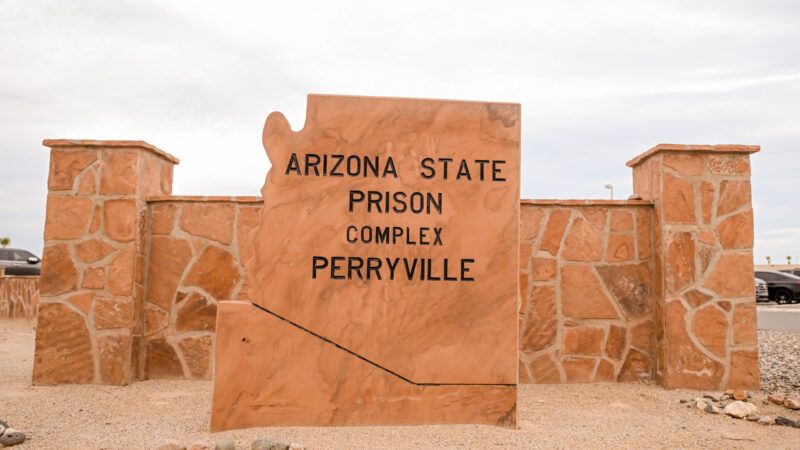Arizona Just Created, Then Defunded, an Independent Watchdog for Its Troubled Prison System
Criminal justice reform advocates are still hopeful the office can secure outside funding and bring much-needed transparency to Arizona's prisons.

Weeks after Arizona lawmakers voted overwhelmingly to create an independent oversight office to monitor its deeply troubled prison system, the new office's future is in question after its funding was stripped from a state budget bill.
The Arizona House and Senate passed Senate Bill 1507 late last month by wide margins, and Democratic Gov. Katie Hobbs signed it into law. The new law will create an office tasked with independent oversight of the Arizona Department of Corrections, Rehabilitation and Reentry (ADCRR), including monitoring compliance with policies and investigating complaints.
The office was originally set to receive $1.5 million in appropriations in the state's budget, but the funding became a sticking point between the legislature and Hobbs' office. To keep the bill from being scuttled altogether, it was amended to allow the office to be funded through other legislative appropriations, federal grants, and private sources.
The passage of the legislation was the result of years of work from prison reform advocates and a growing recognition by the state that it could no longer hide the problems in its prisons. The ADCRR has been in near-constant litigation for more than a decade—mostly on the losing side—because of gruesome medical neglect and barbaric indifference by prison officials.
John Fabricius, executive director of the Praxis Initiative, spent 15 years incarcerated in the ADCRR, and since his release in 2018, he's worked with other criminal justice advocacy groups to get a law passed in Arizona to bring some sort of transparency to state prisons. He says he realized while behind bars that the ADCRR had "total narrative control" over information, and what was really happening wasn't getting out to anyone—reporters, lawmakers, and even prison administrators.
"I watched people die," Fabricius says. "I watched a guy lose a leg. I watched my friend go blind. It was crazy. It was insane in there."
In the case of his friend, Fabricius says the man went permanently blind in one eye after waiting three months for an outside appointment and then nine months for surgery to treat a detached retina. Fabricius says that, while his friend was putting in requests to see a doctor, prison medical staff offered him Visine for his occluded eye.
Those kinds of stories are common in the ADCRR.
In 2022, a federal judge ruled that Arizona prison officials were deliberately indifferent to "grossly inadequate" medical and mental health care, violating inmates' Eighth Amendment rights.
The ruling came after an expert witness report filed in the case described appalling and fatal delays in medical care for incarcerated people inside the ADCRR: A paraplegic man was left to physically deteriorate until his penis had to be amputated. A man with undiagnosed, untreated lung cancer lost 90 pounds and died "slowly and agonizingly" without pain medication. A woman's multiple sclerosis was ignored and misdiagnosed until she was left, at age 36, nearly completely paralyzed.
"No legitimate humane system would operate in this manner," Judge Roslyn Silver of the U.S. District Court for the District of Arizona concluded.
Silver also found that the ADCRR was yet again violating the terms of a settlement agreement in a long-running lawsuit over prison medical care and conditions.
The American Civil Liberties Union (ACLU) of Arizona, the Arizona Center for Disability Law, and the law firm Perkins Coie LLP, filed the suit in 2012. The federal class action lawsuit followed media investigations and persistent allegations of fatally inadequate medical care by the ADCRR's medical provider.
The ADCRR agreed to settle the suit in 2015 by taking steps to improve medical care inside its prisons. But since then, the ACLU and other law firms have repeatedly accused the ADCRR of failing to abide by the settlement agreement, and federal judges have agreed.
A federal magistrate judge fined the ADCRR $1.4 million in 2018. Silver held the department in contempt in 2021 and fined it another $1.1 million for failing to meet the benchmarks for proper medical care.
"Arizona has spent tens of millions of dollars in legal fees racked up in federal court on lawsuits over chronic issues inside Arizona prisons," said Lauren Krisai, executive director of Justice Action Network, a criminal justice advocacy group. "The oversight office this bill creates, paired with the improvements Director [Ryan] Thornell is making, will help to identify issues before they become widespread problems, or worse–another federal lawsuit that taxpayers will have to pay to defend."
The question now is where the oversight office will get the money to do its job. State Sen. Shawnna Bolick (R–Maricopa County), the bill's sponsor, said in a statement, "Signing a bill and refusing to fund it is like buying a car and not putting anyone in the driver's seat."
However, Fabricius says there are upsides: Separating the oversight office from the state budget will protect it from meddling by future governors. (And if it can secure outside funding, that's certainly a win for Arizona taxpayers.)
"It is, in the short term, a challenge to get funding to get this up and running," Fabricius says. "But I think, long term, we've built some real strong real stability into the bill with this amendment."
Given the depth of the problems in the ADCRR, which Fabricius has observed up close and personal, he is darkly optimistic: "We've got nothing but opportunity for growth here."


Show Comments (6)